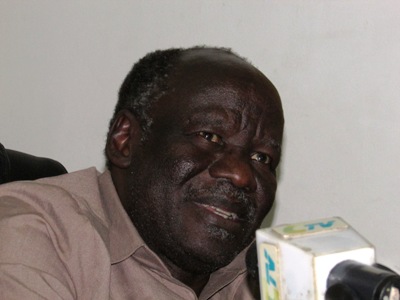S. Sudan opposition parties petition Kiir over security bill
October 17, 2014 (JUBA) – South Sudanese opposition leaders have petitioned president Salva Kiir against signing into law the controversial security bill approved by parliament, saying it contravenes the country’s constitution.

The statement, which bears opposition leader Lam Akol’s name, among others argued that some provisions of the Act contravene the constitution, citing the Bill of Rights.
The opposition group argues that such a sensitive Bill requires a reasonable degree of consensus among our people, while referring to the current crisis facing the country.
Other members from the ruling party from Equatoria region also walked out and a good number absented themselves in protest besides reports that the quorum of the sitting in which the Bill was passed is questionable and hence its legality is in doubt.
“The Bill must conform to the mandate of the National Security Service stipulated in Article 159 of the Constitution. The political parties shall coordinate with other sections of our society to ensure that we finally get a security bill that serves the supreme interests of our people,” Akol said in a statement.
On 8 October, the national legislative assembly passed the security bill after it was referred to its committee on legislation and security matters for scrutiny. Several MPs had expressed concerns regarding certain provisions that give the security agents immunity as well as wide ranging powers of detention and arrest without warrant.
The also bill defines and imposes penalties not in conformity with the penal code.
The law was passed through procedures contrary to Article 28 of the conduct of business regulations of the country’s national legislative assembly (NLA).
“All laws in all countries of the world derive their legitimacy from the national constitution which is the supreme law of the land,” Akol said.
According to the opposition leader, article 159 of the Transitional Constitution of the Republic of South Sudan 2011 stipulates that government operatives shall be subject to the authority of the constitution and the law as well as be subordinate to the civilian authority, respect the will of the people, rule of law, democracy, human rights and fundamental matters, reflect the diversity of the people of South Sudan in its recruitment and be professional and its mandate shall focus on information gathering, analysis and advice to the relevant authorities.
According to Akol, the bill has acknowledged that its legitimacy derives from this constitutional provision by incorporating it verbatim as Section 6 of the Bill.
In clear contravention of this mandate, he argued, the bill provided for excessive powers for the service.
“A few examples will suffice to illustrate the point we are making. Members of the service are granted immunity from initiation of criminal proceedings against them under section 52 of the bill,” said Akol.
He cites section 12, which gives the security service sweeping powers to search, seize property, arrest and detain suspects, as well as monitor publications and broadcasting stations.
Article 29 of the Bill also gives the service power to “gather, retain and disseminate information related to any person” without seeking approval from any oversight body infringing on the privacy of individuals, while section 50 (2) states that a member of the security service shall in the exercise of the powers granted under section 12 “exercise all powers of the police”.
“In other words, the security service is usurping powers of the police,” he added.
Akol further said Chapter VIII of the bill, which deals with offences, contraventions and punishments, was unnecessary as it gives new definitions of crimes and punishments and therefore does not in conform to the penal code.
“Nothing in the Bill deals with ensuring that its recruitment reflects the diversity of the people of South Sudan,” he said.
“In fact, Section 30 on the eligibility for recruitment does not even specify what academic requirements are required opening the door wide for abuse,” he added.
(ST)
